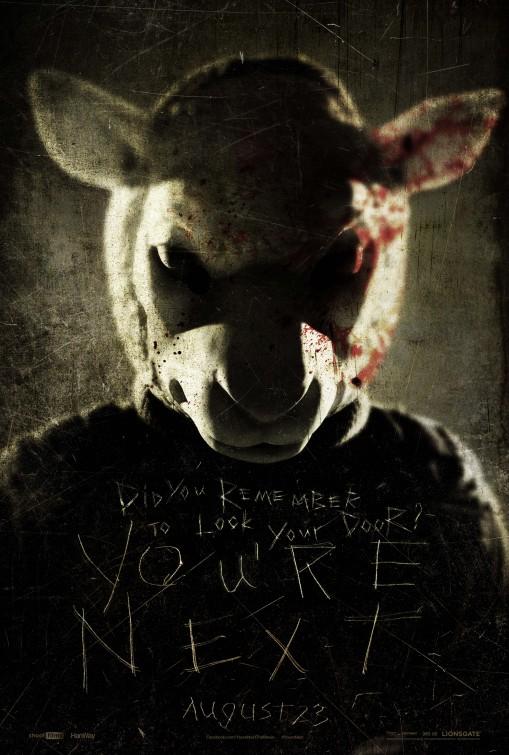Horror movies have always been a quick moneymaker. Once a new angle to the genre is introduced, six more films of the same type are churned out. The cut-and-dry horror films work for some audiences, but they don’t require much thought. It’s just one countless slaughtering after another. In response, director Adam Wingard made a film that not only critiques new horror films, but also spits in its face.
His film “You’re Next” is an excellent film that provides a fresh perspective on the horror genre. The film is set around the dysfunctional Davison family, where middle brother Crispian (AJ Bowen) takes his girlfriend Erin (Sharni Vinson) to a family reunion for the weekend. During the celebrations, a group of masked men attack the family. With fascinating character studies, fresh plot twists, and downright hilarity, “You’re Next” not only critiques the genre, but also serves to correct it.
The film is an illusion. For the first 20 minutes, the audience is forced to endure the most painfully campy moments in horror cinema. The background music is overwhelming. The camera movements are nauseating. The hokey “You’re Next” written in blood next to the body of the second murder just reinforces the camp. Then suddenly, Wingard pulls the rug from under us. He releases several plot twists that truly shock audiences, departing from the standard ‘Cabin in the Woods’ horror narrative. Though camp remains in the film, scenes of natural dialogue and tension coupled with organic camera shots only pull us further in the labyrinth Wingard has created.
The horror movies referenced in this film are numerous: “Texas Chainsaw Massacre,” “Scream” and “A Nightmare on Elm Street.” However, where films like Joss Whedon’s “Cabin in the Woods” exploited horror tropes, “You’re Next” both critiques and corrects these tropes. The obvious correction is the character of Erin. She is introduced as the typical horror heroine, subject to the torture of the mass killers. Later in the film, it is revealed that she grew up in a survivalist compound. Suddenly she is transformed into a resident badass. Erin is everything we want in a horror heroine: smart, resourceful and ruthless.
She is not helpless nor does she luck into safety. She takes on the killers with nothing more than kitchen utensils, clear commentary on the traditional role of women. As the horror heroine receives agency, the masked killers are humanized. Even with non-supernatural killers such the family from “The Strangers,” villains in horror films carry some infallibility. Because they are on the fringes of society, they are portrayed to be nothing like the victims. Not the case in Wingard’s film. Here, audiences hear the killers express pain and suffering. The killers are also unmasked, giving them a human face.
Once audiences see their faces, the infallibility is removed, coming with it the fear of realizing we may not be much different from the killers. Wingard wants audiences to think about the violence portrayed as opposed to just being witnesses. At the same time, he wants his audiences to have fun as well. Camp remains throughout the film, culminating in one of the most hilarious endings in horror movies. Very few horror films succeed in getting audiences to laugh and scream at the same time; Wingard has found this balance.
If you can get beyond the first 20 minutes, you will enjoy “You’re Next.” It is definitely not like any of the horror films topping box offices lately. It’s better.
Rating: 4/5


